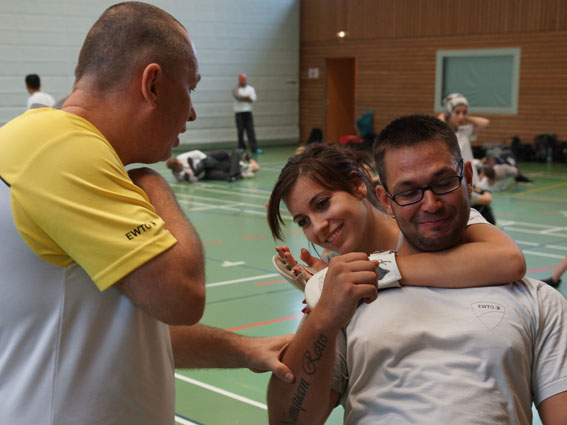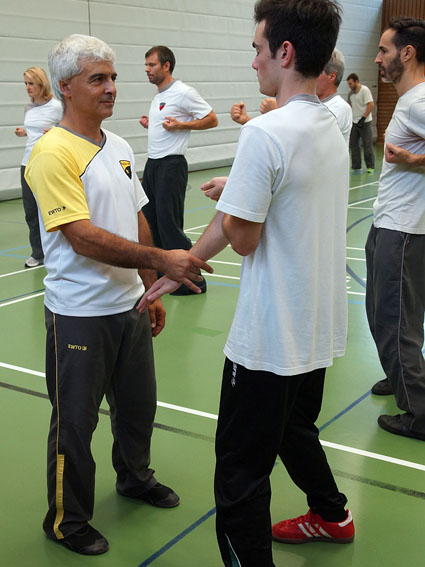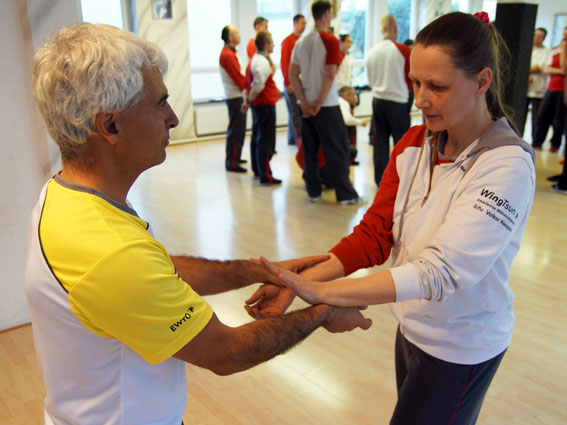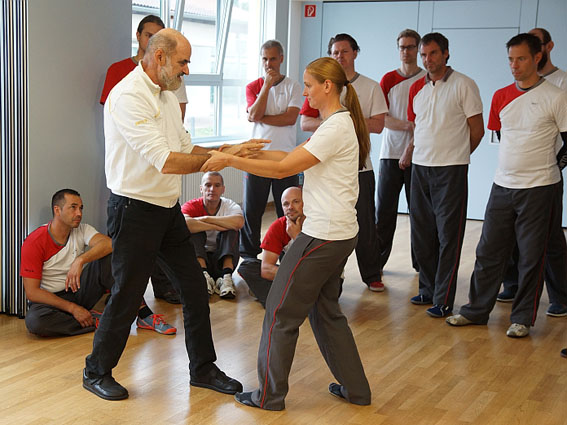Grading examinations in the EWTO
Dear readers,
the month is coming to a close and I am in Kiel just after the instructor seminar weekend. I have to go and see SiFu soon, who is teaching at his mini-iWT school in Dänische Straße, but first let me pen a few lines to you.
Grading examinations are a subject I am asked about again and again. Questions arise such as: When can I present myself for an examination? Am I good enough to be examined yet? Why am I not allowed to take a grading examination yet? Or simply: Why do we have examinations in the first place?
Let me start with the last of these questions:
Why do we have examinations?
At the student level there are examinations for two main reasons – firstly to teach the student the programme in a structured manner (student programmes and grading to assess skills and capabilities), and as a motivation for the individual. Motivation? I don't need any motivation! – Yes, many think that, but in terms of educational psychology it makes sense to learn the programme step by step in defined stages (levels, student grades), so as to obtain an overview, so to speak, and confirmation that the preceding learning content has been absorbed. Now one is ready to train for the next stage.
 |
Especially in WingTsun, the gap between the teacher or master and the beginner is so great that if there were no structured programmes, most students would throw in the towel fairly soon because they see no noticeable progress compared to their teacher. It is not particularly motivating to be told by your teacher: "Just do it for as long as I have (in my case that would be over 35 years), then you will be able to do it like me …"
In the EWTO the student has a very well-conceived and scientifically well founded programme suited to the objectives – e.g. rapid development of self-defence capabilities right from the start – and the abilities of the student concerned. The individual learning goals are clearly formulated, and this principle has proved its worth. All those who train regularly climb the ladder of programmes, and with the necessary application anybody can make it to master level. This is not left to chance or the individual student's talent, but is based on method.
The examinations are more stringent at instructor level, with the aim of quality control. As in a car's MOT test, individual skills such as the forms, ChiSao partner forms etc. and capabilities (see "The Big 7") are checked in several parts and improved if necessary, until the candidate meets the requirements.
When can or should I put myself forward for a student grade examination?
 |
The student grade programmes are structured in such a way that given regular attendance at classes twice a week, it take around three months to cover the content.
There are students who come five times a week, and take additional instruction as well. Others might only train once a week. Naturally those who train more can take examinations at shorter intervals. But here too, quality comes before quantity. Better to absorb the programme fully and leave oneself time – the muscle memory needs this!
I myself have encountered two extreme groups of students: one group wants to take two examinations after just a week, while the other is still unwilling to be examined after six months, because they do not think they are good enough yet.
How do I know when I'm ready to be examined?
Quite simple: the instructor or teacher or the student concerned is fully aware of the situation. He/she is able to make comparisons, and assess precisely who is ready and who is not. That is why it is also important for a WT school to repeat programmes in group sessions one week before the examination, so that the personal instructor can tell a student whether to go for examination or not.
When I attend seminars and examine students, around 50% of the examination is already ticked-off if the student's own teacher has sent him/her for examination, as he sees his student every week and can reliably assess how development is progressing.
The remaining 50% results from my observation of the student, how movements are performed, contact with the student in partner exercises etc. If mistakes are made, there is usually time to correct them during a seminar.
Many students expect to be allowed to demonstrate everything they have learned at such seminars. However I only observe random samples of the learning content, and on the basis of experience, a brief look or fleeting contact is enough to tell me what level the student has reached.
As a result the student sometimes thinks he/she has not even been examined. In fact examinations take place at seminars so that beginners in particular feel no examination stress, and the students are examined during the course of a class or by repetition of programmes, so that they hardly notice it.
Examinations at teaching level
 |
Those wishing to take examinations at the "Higher Grade" or "Teacher Grade" levels need to meet more stringent standards, and at Master level things are even more difficult.
Submitting yourself to such examinations means intensive study and practice of the relevant programmes. The examination goes well beyond demonstrating forms and ChiSao partner forms that have been learned by rote. It is skills and capabilities that are required here, and they often demand more practice and instruction than some believe.
There are minimum preparation times for every teaching or master grade, and these are to be adhered to. So please don't appear before the earliest examination date noted on the examination slip!
Particularly amongst the Higher Grades, candidates sometimes overestimate their abilities as they often have students of their own, train with them and have consequently developed an almighty ego. Of course, many things that work well with your own students do not work very well at all when training with equally proficient Higher Grades or when being examined. This is why it is necessary to practice with various training partners at your own level, apart from constant further development.
There are a number of parts to every Higher Grade examination. This does not necessarily mean that a part will be signed off every time the candidate appears. Those who do not yet have the necessary skills and capabilities will have to work on them and come again.
 |
This applies all the more for Master grades. The examination is also a test of character. Asking for a grade, asking the grandmaster whether the examination is already over, or exerting pressure in any way, disqualifies a candidate from the very start. Because he has shown that he is not yet mature enough for a Master grade. Etiquette towards my SiFu GM Prof. Keith R. Kernspecht requires that the candidate submits the examination slip to him when the minimum preparation time has been reached, and the candidate has intensively practiced the exercises. After the seminar, if GM Kernspecht is satisfied that the candidate has passed that part of the examination, he will sign it off. Sadly I frequently see candidates take the slip and "beg" for the signature, leading to loss of face on their part and showing that they are still unaware of their shortcomings.
This should give you a brief insight into the examination etiquette within the EWTO, and make things clearer. Until the next examination, I wish you all enjoyable learning and training.
Your GM Oliver König
Photos: André Walther/hm




